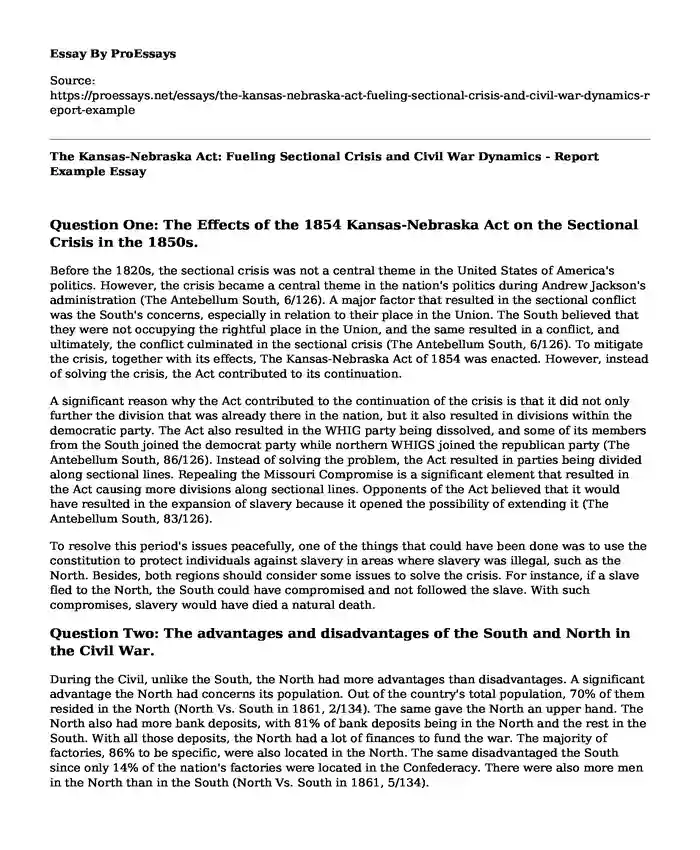Question One: The Effects of the 1854 Kansas-Nebraska Act on the Sectional Crisis in the 1850s.
Before the 1820s, the sectional crisis was not a central theme in the United States of America's politics. However, the crisis became a central theme in the nation's politics during Andrew Jackson's administration (The Antebellum South, 6/126). A major factor that resulted in the sectional conflict was the South's concerns, especially in relation to their place in the Union. The South believed that they were not occupying the rightful place in the Union, and the same resulted in a conflict, and ultimately, the conflict culminated in the sectional crisis (The Antebellum South, 6/126). To mitigate the crisis, together with its effects, The Kansas-Nebraska Act of 1854 was enacted. However, instead of solving the crisis, the Act contributed to its continuation.
A significant reason why the Act contributed to the continuation of the crisis is that it did not only further the division that was already there in the nation, but it also resulted in divisions within the democratic party. The Act also resulted in the WHIG party being dissolved, and some of its members from the South joined the democrat party while northern WHIGS joined the republican party (The Antebellum South, 86/126). Instead of solving the problem, the Act resulted in parties being divided along sectional lines. Repealing the Missouri Compromise is a significant element that resulted in the Act causing more divisions along sectional lines. Opponents of the Act believed that it would have resulted in the expansion of slavery because it opened the possibility of extending it (The Antebellum South, 83/126).
To resolve this period's issues peacefully, one of the things that could have been done was to use the constitution to protect individuals against slavery in areas where slavery was illegal, such as the North. Besides, both regions should consider some issues to solve the crisis. For instance, if a slave fled to the North, the South could have compromised and not followed the slave. With such compromises, slavery would have died a natural death.
Question Two: The advantages and disadvantages of the South and North in the Civil War.
During the Civil, unlike the South, the North had more advantages than disadvantages. A significant advantage the North had concerns its population. Out of the country's total population, 70% of them resided in the North (North Vs. South in 1861, 2/134). The same gave the North an upper hand. The North also had more bank deposits, with 81% of bank deposits being in the North and the rest in the South. With all those deposits, the North had a lot of finances to fund the war. The majority of factories, 86% to be specific, were also located in the North. The same disadvantaged the South since only 14% of the nation's factories were located in the Confederacy. There were also more men in the North than in the South (North Vs. South in 1861, 5/134).
Even though the South had numerous disadvantages compared to the North, it also had a few advantages, and some of them regarded food, livestock, and other crops. The South had more crops, such as cotton, and selling these crops helped the region raise revenue to be used in the war. Besides, more animals such as donkeys and mules were in the South. With regard to food security, the South had more farmers than the Union. As a result, these farmers' produce played a significant role in ensuring food security (North Vs. South in 1861, 6/134).
The North’s victory in the Civil War was not inevitable; it had more resources than the South. Factors such as more factories aided the North in manufacturing weapons; railroads made it easy to transport the weapons manufactured.
Works Cited
Class Notes. “The Antebellum South”
Class Notes “North vs. South in 1861”
Cite this page
The Kansas-Nebraska Act: Fueling Sectional Crisis and Civil War Dynamics - Report Example. (2024, Jan 28). Retrieved from https://proessays.net/essays/the-kansas-nebraska-act-fueling-sectional-crisis-and-civil-war-dynamics-report-example
If you are the original author of this essay and no longer wish to have it published on the ProEssays website, please click below to request its removal:
- Reasons for the Fall of The Roman Empire
- Why Authoritarianism Persists in the Middle East
- The Death Penalty in the US - Paper Example
- The Monroe Doctrine Essay Example
- Shang War Chariots Essay Example
- Essay Sample on 2008 War Between Georgia & Russia: The Five-Day Battle
- Essay on Uprooting Discrimination: Governments Combatting Victimization of LGBT+ Individuals







